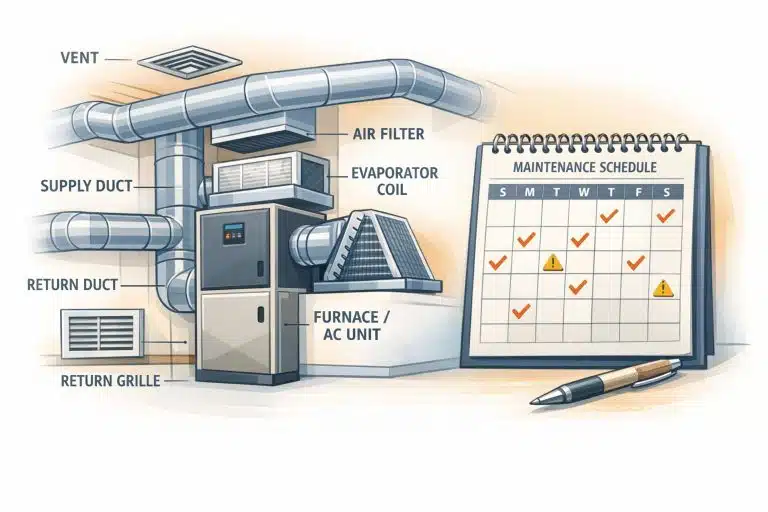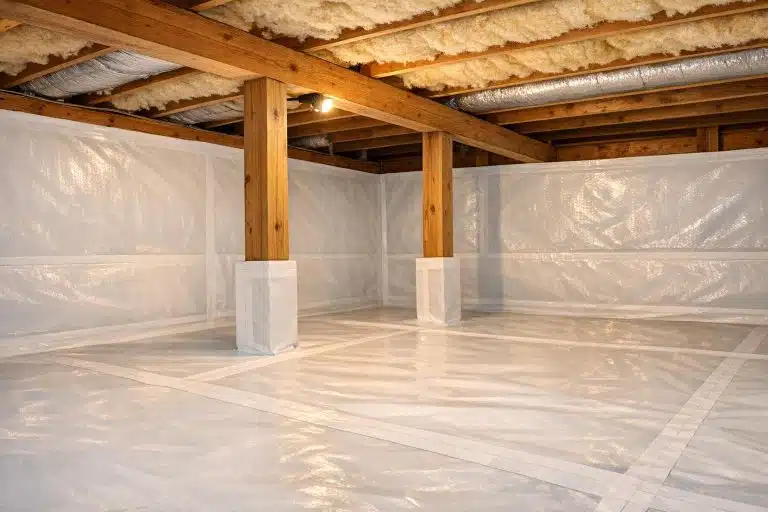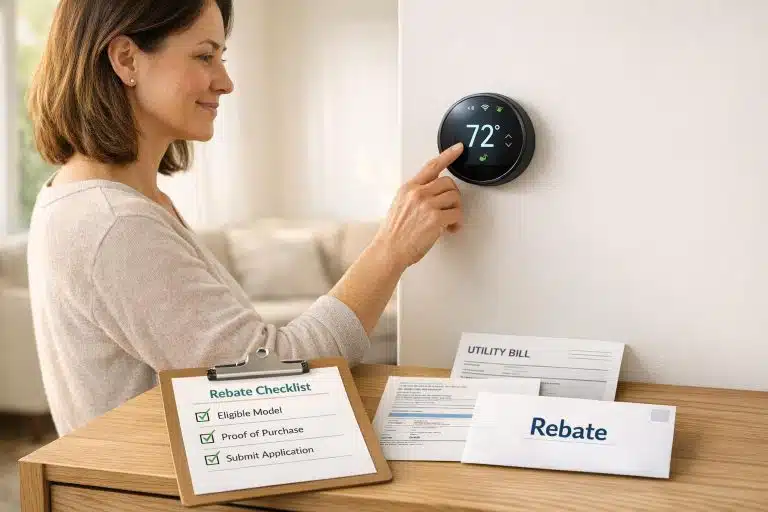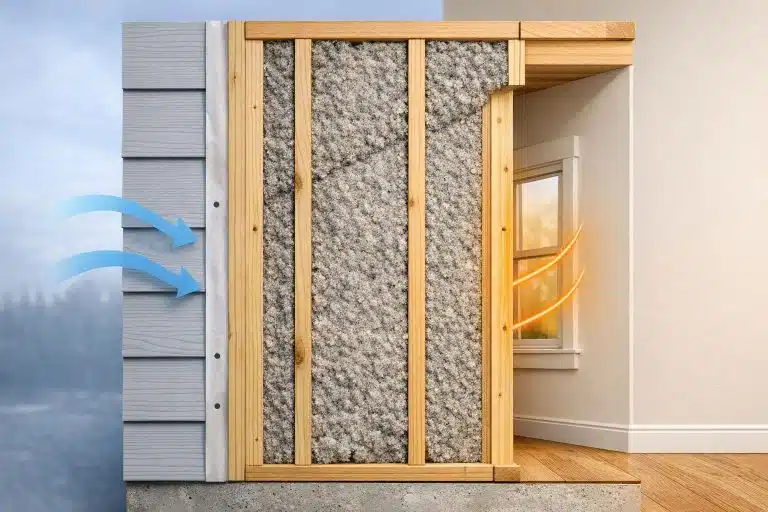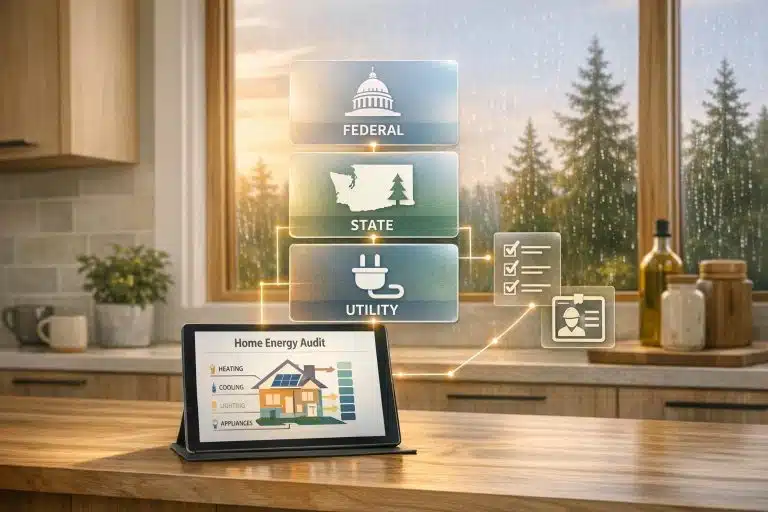Have you recently noticed a musty smell spread out in your house and crawl space? Despite your best efforts to clean every corner of your home to eliminate that headache-triggering odor, it still lingers. Aromatherapy is a relief, but sadly, it is only a temporary solution. The real problem is lurking in the uninviting, web-covered, and pitch-black crawl space of your home.
Now is the perfect time to investigate the often neglected part of your house. Especially your crawl space. Go grab your flashlight and look for home and crawl space mold growth – you will thank us later!
Key Points
- White Mold Detection: Commonly found in dark, damp crawl spaces, white mold is identifiable by its distinct appearance, which can be grayish or greenish.
- Health Risks: Both white and black molds, which can develop if white mold is left untreated, pose health hazards such as respiratory issues, allergies, and, in severe cases, neurological problems.
- Effective Removal Method: A five-step process will effectively remove white mold, including ventilating the space, vacuuming the mold with a HEPA filter, scrubbing with a vinegar solution, and sanding wooden areas.
- Prevention Tips: Key preventative measures include maintaining dry conditions, using dehumidifiers, ensuring proper ventilation, repairing foundation cracks, and regularly cleaning gutters to prevent mold growth.
- Long-Term Maintenance: Regular inspections and HVAC system maintenance to prevent serious damage to the house’s structure and protect against ongoing health issues caused by mold exposure.
White mold growth, despite its name, can actually be of a grayish or greenish shade. If you spot its spores spreading on the surface of your crawl space, you’d better get rid of them at once before you have to deal with a serious mold infestation that develops from crawl space mold into the whole home.
When left unchecked, white mold growth can turn into black mold, and both pose a number of health hazards. Waste no time and bookmark this page for an easy and effective solution to your mold problem!
How to Get Rid of White Mold in Crawl Space
Removing white mold growth in the crawl space is a breeze with our 5 simple steps. The same process can be applied any time you spot mold buildup again. In rare cases, when mold growth spores have occupied most of the crawl space, it is better to hire a mold remediation specialist from Envirosmart Solutions – more on that later. For now, let’s take a look at a few basic procedures for removing white mold growth.
1. Gear Up
White mold is essentially fungi, and every fungus species is a bit scary to touch or eat. Crawl space mold growth is particularly scary since we know that it causes headaches and pollutes fresh air with white mold spores. To be on the safe side, it is always better to put on protective gear when dealing with any kind of white mold growth cleaning.
Don’t worry; you won’t need a radiation suit to get close to white mold – unless you secretly harbor nuclear waste in your crawl space walls – gloves and a face mask are enough to deal with house and crawl space white mold (or black mold, for that matter). If the crawl space mold is located in the hardly accessible high structure of the house, you may also need protective goggles, however.
If you have allergic reactions to excess crawl space moisture, black mold, and white mold, it would be better to ask someone else to handle mold removal.
2. Air the Crawl Space
Before you start white mold removal, make sure to ventilate the crawl space. Since mold has been growing there for some time, its spores may have accumulated in the crawl space. Keep the window open throughout the whole process of mold removal – assuming your crawl space has a window, that is. If it’s impossible to maintain sufficient airflow, consider using a dehumidifier.
3. Vacuum White Mold
Over the years, the white mold may build up in the crawl space to the point that you can simply vacuum it away. However, only a vacuum with a HEPA filter will prevent spores from spreading during mold cleanup. Once finished, remove the filter outdoors and place it in the sealed bag before disposing it.
4. Scrub the Mold Off
Now that you have eliminated some crawl space white mold (or wherever your white mold is lurking), it is time to scrub off what remains. To do this, you will need a mixture of water, detergent, and some vinegar in a spray bottle. Spray the killing solution onto the affected area and let it do its magic.
While you’re drinking coffee and taking a break from wearing personal protective equipment, you can gather up the energy for probably the most physically demanding part of the process – scrubbing the crawl space or home.
Some mold can be harder to clean – especially in a dimly lit crawl space – so you will need to get a brush and do your best to remove the fungi.
5. Sand Down the Wooden Structures
The final step is crucial – sanding down the wood and refinishing it. It will help you treat mold living deep inside small dentures and prevent a future mold outbreak.
If you properly control moisture and follow our white mold prevention tips, you will be able to breathe with ease, free from worry about mold issues.
Types of Mold in Crawl Space
Damp crawl space areas can have various white mold types, ranging from allergy-triggering Alternaria to toxic Stachybotrys. But we’ve decided to divide them into white, yellow, and black since nobody is capable of identifying fungi species with the naked eye, especially in a dimly lit room or dark crawl space.
White Mold
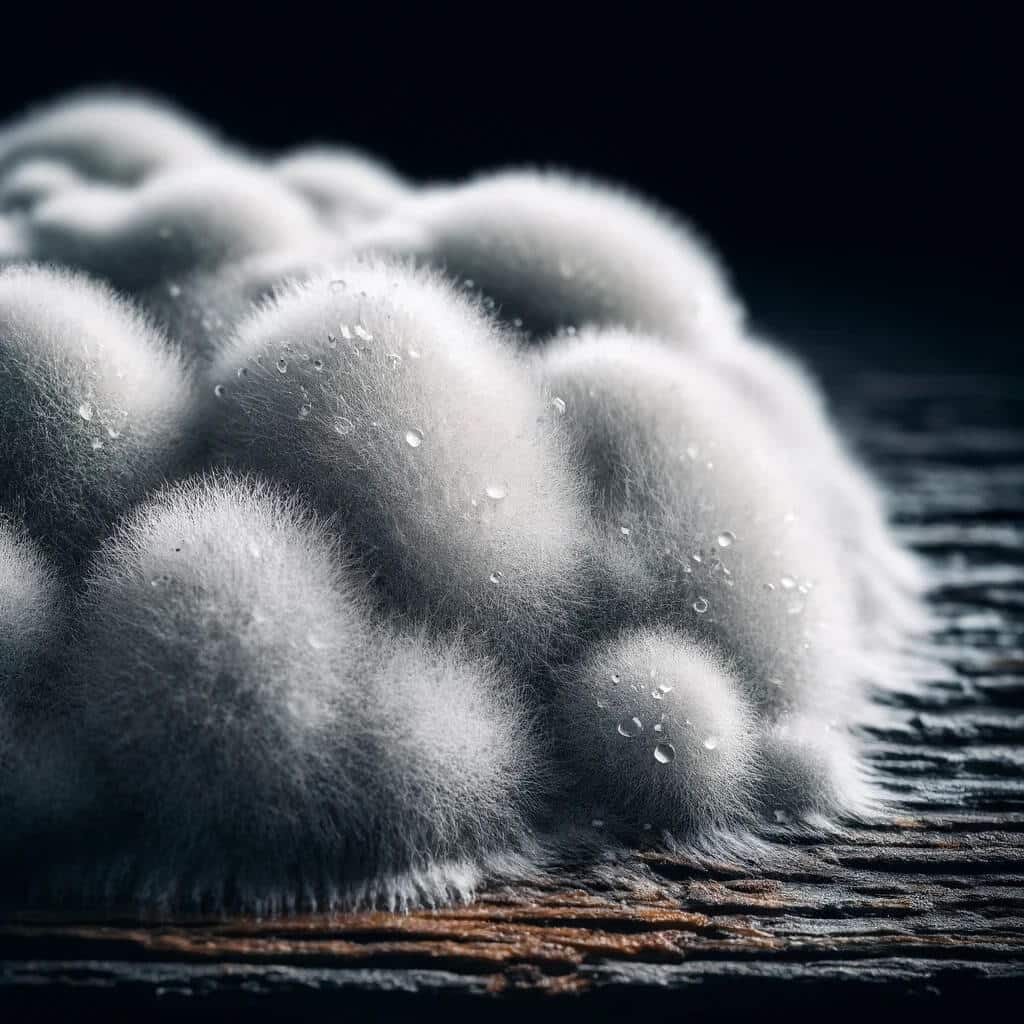
You might be familiar with white mold forming on food. Its appearance is similar to fluffy snow. It isn’t uncommon to see these signs of white mold in crawl spaces where there is a high level of humidity and a lack of adequate ventilation.
White fungal growth can be the first step of mold development, as it can later turn into black mold in your crawl space – or any other area of the house.
Yellow Mold
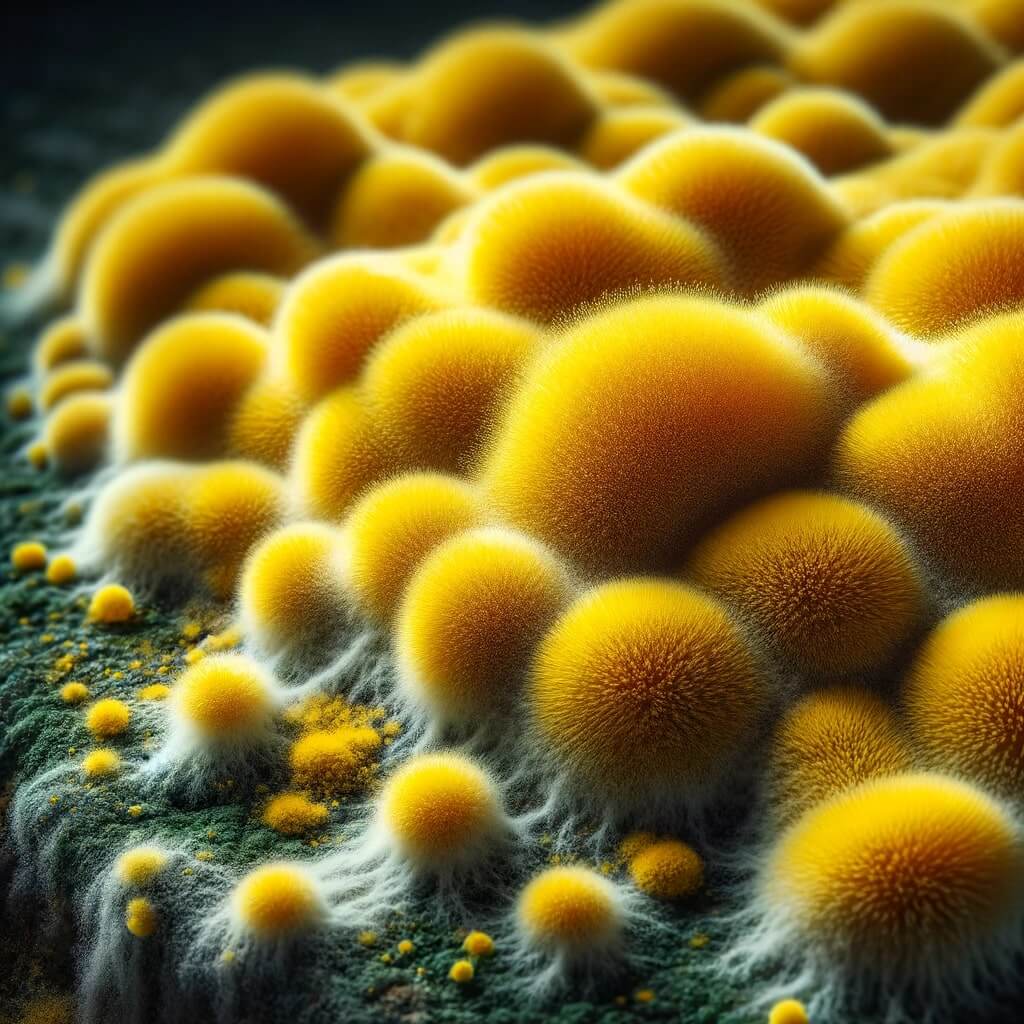
Only a few people know of the existence of yellow mold. Similarly to other fungi, it feeds on organic materials and moisture – an accurate description of any crawl space.
Yellow mold commonly appears on wood, leading to its decay and eventual collapse. Therefore, if you spot yellow mold in your house, our mold removal company is ready to help.
Black Mold
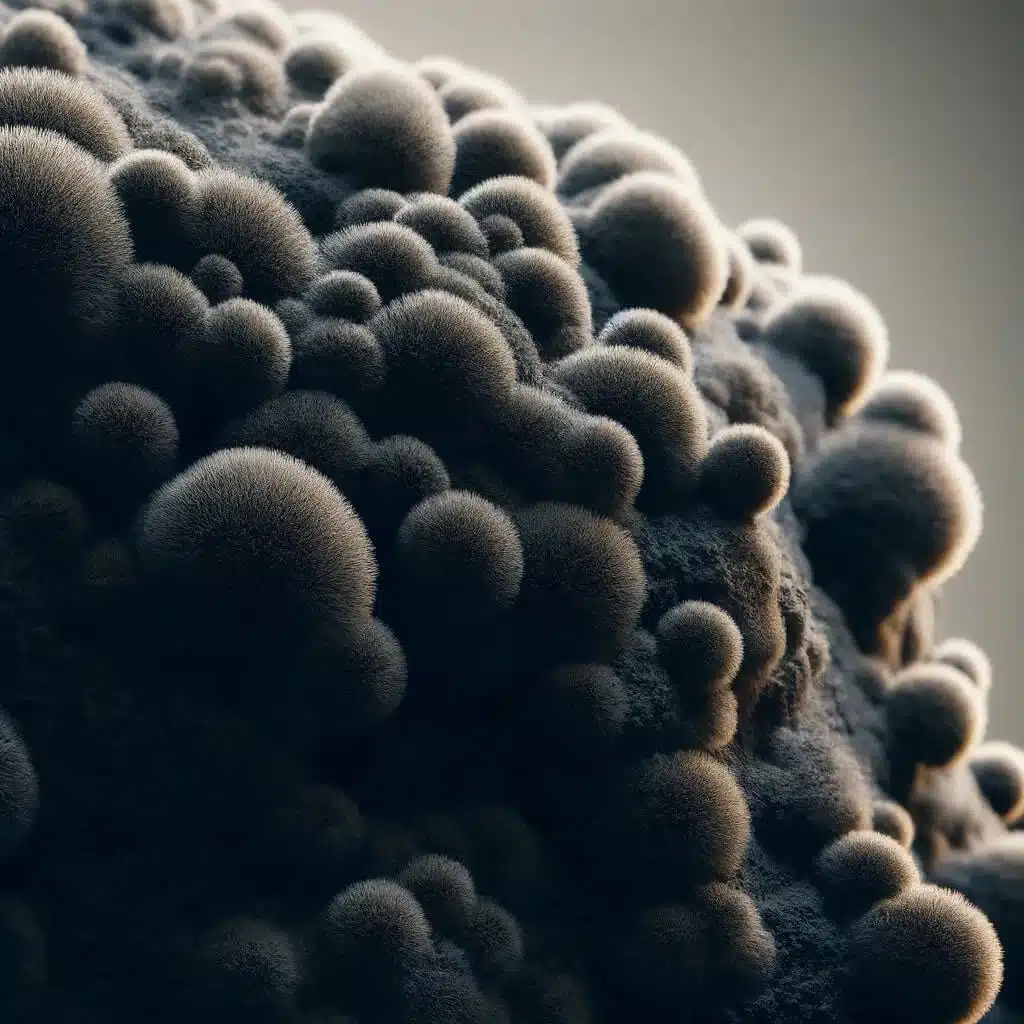
Black mold grows on carpets, walls, subflooring, and other crawl spaces used by excess moisture. This fungus species is considered the most toxic and has to be taken care of immediately.
If you suspect mold has developed on crawl space walls or floors, make sure to eliminate the infestation as soon as possible. Otherwise, breathing in black mold spores may lead to health complications.
Common Reasons for Mold Growth
There are many reasons why crawl space mold appears, but we want to highlight the most common problems we encounter in our work. Here are the four most common reasons our clients have mold in crawl spaces:
1. Moisture: A humid crawl space creates suitable conditions for mold to grow. Lack of moisture control is likely to cause mold to accumulate. Commonly, it is a bathroom, attic, or basement that we inspect for mold buildup.
2. Flooding: Crawl space flooding that is left unattended is likely to create a moderate growth of mold within the first two days. Therefore, it must be your priority to dry and ventilate the crawl space in case of flooding. Otherwise, water damage and humidity will let white mold accumulate on the surface.
3. Poor Ventilation: One of the ways to reduce humidity is to ensure proper ventilation. Without constant airflow, a room remains moist so that mold can emerge in tight spaces.
4. Roof Leaks: Roof leaks are another cause of mold growth. Leaks can damage not only the floor but also infect the ceiling, creating a double mold problem.
How to Prevent Mold in Crawl Space?
As you can see, fighting white mold is a tedious battle. If you haven’t struggled with cleaning white mold, then it’s best to keep it that way. To prevent mold growth, follow these easy tips:
1. Reduce Room Dampness: Never allow water to build up in any room. Whenever there is any leak, make sure to clean it up before your room or crawl space becomes damp. Otherwise, you’re creating a perfect environment to grow mold.
In addition to keeping your crawl space dry, ensure there is sufficient ventilation.
2. Purchase a Dehumidifier: Some places in your house are impossible to ventilate, but there is an easy fix for that – a dehumidifier. Place the device in your basement or attic to keep the humidity level low. You can also purchase a moisture meter to monitor which part of your house has a moisture problem. The moisture meter will indicate areas that need addressing.
4. Install a Vapor Barrier: Although it won’t completely eliminate the problem, a plastic vapor barrier can be installed in a crawl space to reduce moisture. As the name suggests, the plastic vapor barrier protects your house from vapors that rise up from the moist soil.
5. Clean Gutters: Don’t let rainwater ruin your house walls with white mold. Every now and then, check the gutters and make sure the flow is directed a few feet away from the foundation.
Cleaning the gutters is particularly important if you haven’t fixed cracks yet. Otherwise, during heavy rain, the entire crawl space may be flooded.
Long-Term Consequences of Mold in Crawl Spaces
Neglecting mold in your crawl spaces can lead to serious issues over extended periods, and if mold is not addressed, it can cause terrible damage to a house, requiring quite expensive repairs.
Affected surfaces weaken and undermine the home’s structure. Health risks are also a huge concern with long-term mold exposure – frequent inhalation of mold spores may even result in unfortunate respiratory issues, continuous allergic reactions, or even neurological symptoms.
The fact is that preventing these long-term issues requires consistent measures. You must inspect your crawl space routinely for moisture and mold while also ensuring that your home’s external water drainage systems are dependable in preventing water from gradually seeping into the foundation.
Selecting mold-resistant building materials in moisture-prone areas is always a wise choice, and in regions with consistent humidity, a quality dehumidifier in your crawl space can greatly reduce moisture levels.
Last but by no means least, regular HVAC maintenance is also important, as it can be an unnoticed, almost secret source of potentially deadly mold. Changing out your filters regularly and keeping ducts nice and clean will help prevent mold spores from spreading through your home.
Having a professional evaluate your crawl space from time to time is also a wise move, as they will identify potential problems early and suggest effective solutions, ensuring a safe, mold-free environment for your loved ones.
Taking these proactive steps can protect you from the toils of health and repair costs in the future!
Get a Free Inspection Now
White mold in your crawl space is fixable when identified in the early stages. An affordable solution is to add vinegar, water, and detergent to a spray bottle and apply the mixture to the infected areas of the crawl space.
Mold can be harmful and pose numerous health risks to people who are either sensitive or allergic to the fungus, including respiratory problems and rash reactions.
Envirosmart Solutions is a mold remediation company that specializes in HVAC systems that can help you get rid of mold problems in the most inaccessible spaces.
Get a free crawl space inspection now, and never spend a day in a house with a musty smell all day long.
White Mold – FAQ
Is white mold dangerous?
According to the Environmental Protection Agency, inhaling or touching mold spores may cause allergic reactions. Some sensitive people may suffer from asthma attacks. Other symptoms may include irritation of the eyes, nose, and throat or other fever-type symptoms (e.g., sneezing, coughing, stuffy nose, etc.).
Is it safe to touch mold barehand?
Although most mold in crawl spaces is safe to touch bare hands and won’t make you sick, some types of fungi can cause skin irritation and rashes. Despite this, it is always better to get rid of mold in a crawl space with protective gloves and a face mask.
Can I vacuum the mold?
Yes, you can use any vacuum with a HEPA filter for mold remediation in your crawl space or any other area of the house, although we would not recommend a HEPA filter as the lone solution.
Sources
https://carolinapublicpress.org/63432/crawl-space-mold-greensboro-nc-habitat-homes-tensions/
https://building-performance.org/bpa-journal/the-scary-crawlspace/


